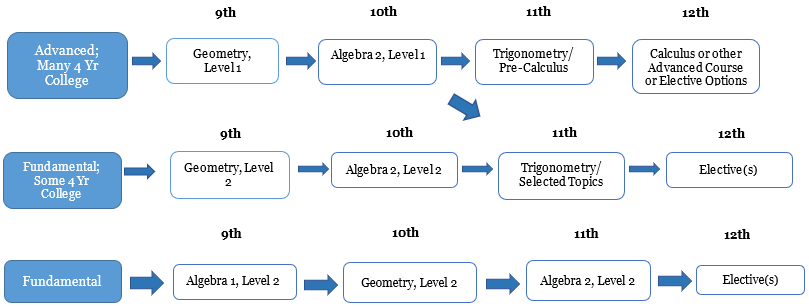
Mathematics
Mathematics Considerations
Students should be aware that most college majors require at least one college level mathematics course. Careful selection and successful completion of high school mathematics courses will provide the necessary preparation for college work.
Both level 1 and level 2 in the mathematics sequence (Algebra I, Geometry, Algebra II and Trigonometry) are academic in nature. The differences between the levels are the depth and pace of the curriculum. Level 1 courses treat topics more rigorously and solve more complex applications of the topics. Since level 2 courses are less rigorous, it is difficult to follow a level 2 course with a level 1 course. Students who do not do well in eighth grade Algebra I, should consider repeating Algebra I, Level 1 in ninth grade so that they may continue in a level 1 sequence.
To determine a sequence of academic courses for ninth through twelfth grades, select the appropriate ninth grade starting course based on eighth grade achievement. Follow the sequence for tenth through twelfth grades. All mathematics course selections require teacher recommendation.
Potential Mathematics Pathways
*Core Math Courses
• Pre-Algebra
• Algebra 1 (Level 1-2)
• Geometry 1 (Level 1-2)
• Algebra II (Level 1-2)
• Trigonometry / Pre-Calculus
• Trigonometry / Selected Topics
#Advanced Courses
• Trigonometry / Pre-Calculus
• Elementary Concepts of Calculus
• AP Calculus 1
• AP Calculus 2
• AP Statistics
#Elective Courses
• Statistics
• **Data Science
We require students to take and pass at least 3 credits of mathematics courses for graduation.
*Core Math courses may have been taken at the middle school level, but do not count towards required credits for graduation. Advancement in middle school impacts the beginning of the course sequence in High School.
**Data Science may be taken to obtain your third math credit as long as you have passed Algebra 1 and Geometry.
#It is important for students to consider their post-secondary plans and research the requirements when determining their choice of advanced and elective courses.
Potential Pathways
Pre-Algebra
3100 1 Credit 1 Semester Weight of 1.0
Prerequisite: Teacher recommendation.
This course includes a more rigorous treatment of the concepts necessary for completion of Algebra I. These concepts include operations with integers and rational numbers, coordinate geometry, probability, ratio and proportion, measurements of length, area and volume and properties of exponents. This course develops algebra concepts necessary to solve multistep equations and inequalities, and graph linear equations in two variables.
Algebra I, Level 1
3010 1 Credit 1 Semester Weight of 1.1
Prerequisite: At least an 85% in MMS Intro to Algebra or teacher recommendation.
This course develops fundamentals, language, and techniques of algebra in the operations of the real number system. Topics included are signed numbers, algebraic sentences, equations, real number properties, special products and factoring, algebraic fractions, powers, roots, linear equations and systems, linear inequalities, the concept of function, simple quadratic functions, radicals, and graphic analysis of linear equations. The level 1 course also includes proportion and variation. The differences between level 1 and level 2 are the depth and detail involved in the development of major concepts and the style of discussion. Test construction also varies with the level. It is recommended that academically oriented students with an "A" average in eighth grade math select level 1.
Algebra I, Level 2
3020 1 Credit 1 Semester Weight of 1.0
Prerequisite: An earned credit in Grade 8 or Pre-Algebra.
This course develops fundamentals, language, and techniques of algebra in the operations of the real number system. Topics included are signed numbers, algebraic sentences, equations, real number properties, special products and factoring, algebraic fractions, powers, roots, linear equations and systems, linear inequalities, the concept of function, simple quadratic functions, radicals, and graphic analysis of linear equations.
Geometry, Level 1
3040 1 Credit 1 Semester Weight of 1.2
Prerequisite: A second semester average of at least an 80% in MMS Algebra I and teacher recommendation, or a 93% in Algebra I, Level 1 (3010).
This course is heavily dependent upon mastery of Algebra I skills. In this course students develop their skills in defining terms, thinking logically, and arriving at conclusions, both geometric and non-geometric. Lines, angles, circles, triangles, quadrilaterals and other geometric figures are studied. Students become familiar with two-column, paragraph, and indirect proofs. The relationship of geometry to arithmetic, algebra, and right triangle trigonometry is emphasized. In level 1 some basic concepts of solid geometry and probability also are developed. The differences between level 1 and level 2 are the depth and detail involved in the development of major concepts, the types of applications studied, and the style of discussion. Test construction varies with the level. It is recommended that academically oriented students select level 1.
Geometry, Level 2
3050 1 Credit 1 Semester Weight of 1.1
Prerequisite: An earned credit in Algebra I.
In this course students develop their skills in defining terms, thinking logically, and arriving at conclusions, both geometric and non-geometric. Lines, angles, circles, triangles, quadrilaterals and other geometric figures are studied. Students become familiar with two-column, paragraph, and indirect proofs. The relationship of geometry to arithmetic, algebra, and right triangle trigonometry is emphasized.
Algebra II, Level 1
3060 1 Credit 1 Semester Weight of 1.2
Prerequisite: At least an 80% in Geometry, level 1 (3040) and a second semester average of 80% in MMS Algebra I.
This course extends concepts studied in Algebra I and develops new algebraic skills and techniques. Precise use of language and symbols is stressed. Topics covered include extension of certain topics of Algebra I with emphasis on linear equations and inequalities, operations with real and complex numbers, factoring, exponents, complex fractions, rational and radical equations, relations and functions, quadratic, exponential and logarithmic functions, and probability. The differences between level 1 and level 2 are the depth and detail involved in the development of major concepts and the style of discussion. Test construction also varies with the level. Students who are planning to elect Trigonometry and Pre-Calculus (3070), then Calculus and/or planning a career in mathematics or related fields should elect level 1.
Algebra II, Level 2
3065 1 Credit 1 Semester Weight of 1.1
Prerequisite: An earned credit in Geometry, level 2 (3050).
This course extends concepts studied in Algebra I and develops new algebraic skills and techniques. Precise use of language and symbols is stressed. Topics covered include extension of certain topics of Algebra I with emphasis on linear equations and inequalities, operations with real and complex numbers, factoring, exponents, complex fractions, rational and radical equations, relations and functions, quadratic, exponential and polynomial functions.
Data Science
3068 1 Credit 1 Semester Weight of 1.0
Prerequisite: Successful completion of Algebra 1 level 2 and Geometry Level 2. May only be scheduled as a student’s third math credit towards graduation.
This course will provide students with a rich understanding and appreciation of how data is used by professionals to address real-world problems as well as how data is used in our normal daily lives. Students will learn how to apply this knowledge to identify and tackle real-world problems in our communities. Rather than focus on the calculation and development of data statistics, this course will analyze statistical information and graphics to identify patterns in data, generating hypotheses and developing critical questions.
Trigonometry and Pre-Calculus
3070 1 Credit 1 Semester Weight of 1.3
Prerequisite: A second semester average of at least 80% in Algebra II, level 1.
This course is intended as a pre-calculus course with a strong emphasis on trigonometry. Additionally, linear, quadratic, polynomial, exponential, logarithmic, and circular relations are studied. The concepts of limit and continuity are introduced.
Trigonometry and Selected Topics
3080 1 Credit 1 Semester Weight of 1.2
Prerequisite: An average of at least an 85% in Algebra II, level 2
This course includes a full year of trigonometry including basic trigonometric functions, trigonometric identities, the laws of sine and cosine, solving triangles, and application of trigonometry in real-world situations. Additional topics developed in this course are complex numbers, exponential and logarithmic functions, and sequences and series.
Statistics
3084 1 Credit 1 Semester Weight of 1.2
Prerequisite: An earned credit in Algebra 2, Level 1 or 2 (3010 or 3020)
This course provides students with the skills to analyze and interpret statistical data. The topics studied are descriptive statistics, probability, inferential statistical concepts, and inferential statistical methods. Technology will be an integral part of the learning process. Graphing calculators, spreadsheets, video lessons and internet-capable communications will be utilized.
AP Statistics
3085 1 Credit 1 Semester Weight of 1.3
Prerequisite: An earned credit in Algebra 2, Level 1 (3010), or at least a 93% or teacher recommendation in Algebra 2, Level 2.
This course provides students with the skills to analyze and interpret statistical data. The topics studies are descriptive statistics, probability, inferential statistical concepts, and inferential statistical methods. Technology will be an integral part of the learning process. Graphing calculators, spreadsheets, video lessons and internet-capable communications will be utilized. Students should expect to devote adequate time in outside-of-class preparation for this course. The Advanced Placement Statistics exam may be taken in May.
Elementary Concepts of Calculus
3088 1 Credit 1 Semester Weight of 1.2
Prerequisite: An earned credit in Trigonometry and Pre-Calculus.
This course will concentrate on the elementary topics of calculus. Limits, derivatives and integrals will be the main focus but handled on a non-AP level. This course should not be substituted for a college level calculus; instead, it is intended for college-bound students who plan to study business, economics, management and/or the social and life sciences.
Advanced Placement Calculus I
3090 1 Credit 1 Semester Weight of 1.3
Prerequisite: An 85% in Trigonometry and Pre-Calculus or teacher recommendation.
This course is intended for students who have a thorough knowledge of college preparatory mathematics, including algebra, axiomatic geometry, trigonometry, and analytic geometry (rectangular and polar coordinates, equations and graphs, lines, and conics). Calculus I is a course in introductory calculus with elementary functions. The course includes the topics studied in a first-semester college calculus class. Specific areas of study include informal and formal differentiation, indefinite and definite integration, application of the derivative and integral, transcendental functions, analytic geometry, and differential equations. Applications of calculus to real-world problems are emphasized. A graphing calculator is used extensively. Students should expect to devote adequate time in outside-of-class preparation for this course. The Advanced Placement Calculus AB exam may be taken in May.
Advanced Placement Calculus II
3095 1 Credit 1 Semester Weight of 1.3
Prerequisite: An earned credit in AP Calculus I with a second semester average of at least 80%.
This course is intended for students who have a thorough knowledge of analytic geometry and elementary functions in addition to college preparatory algebra, geometry, and trigonometry. The course extends the topics studied in Calculus I to include vector and parametrically defined functions, additional integration methods, and sequences and series. The Advanced Placement Calculus BC exam may be taken in May.
Sports Analytics
3200 Grades 9-12 .25 Credit 1 Semester ( 1X Per Cycle, Day 6 - Period 5 or 6)
In this course, students will explore the mathematics of sports analytics. Students will consider data visualizations, player performance measurements, conditional probabilities, and the business of sports. The course will feature hands-on activities, projects, and discussions to allow students to experience the methods used to gather data and make decisions in the sports world.
